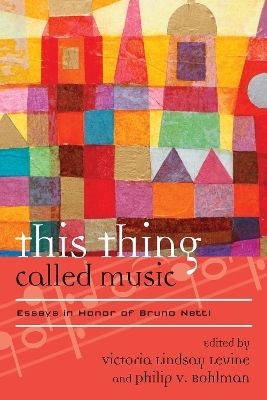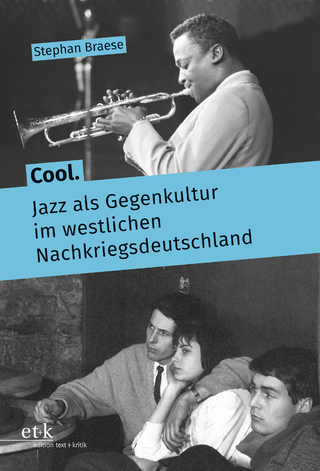
This Thing Called Music
Rowman & Littlefield (Verlag)
978-1-4422-4207-4 (ISBN)
The most fundamental subject of music scholarship provides the common focus of this volume of essays: music itself. For the distinguished scholars from the field of musicology and related areas of the humanities and social sciences, the search for music itself—in its vastly complex and diverse forms throughout the world—characterizes the lifetime of reflection and writing by Bruno Nettl, the leading ethnomusicologist of the past generation. This Thing Called Music: Essays in Honor of Bruno Nettl salutes not only a great scholar and beloved teacher, but also a thinker whose search for the meaning and ontology of music has exerted a global influence.
Editors Victoria Lindsay Levine and Philip V. Bohlman have gathered essays that represent the many dimensions of musical meaning, addressing some of the most critically important areas of music scholarship today. The social formations of musical communities play counterpoint to analytical studies; investigations into musical change and survival connect ethnography to history, offering a collection of essays that can serve as an invaluable resource for the intellectual history of ethnomusicology. Each chapter explores music and its meanings in specific geographic areas—North and South America, Europe, Asia, and the Middle East—crossing the boundaries of genre, repertory, and style to provide insight into the aesthetic zones of contact between and among the folk, classical, and popular musics of the world.
Readers from all disciplines of music scholarship will find in this collection a proper companion in an era of globalization, when the connections that draw musicians and musical practices together are more sweeping than ever. Chapters offer models for detailed analysis of specific musical practices, while at the same time they make possible new methods of comparative study in the twenty-first century, together posing a challenge crucial to all musicians and scholars in search of “this thing called music.”
Victoria Lindsay Levine is professor of music at Colorado College, where she has served as the John D. and Catherine T. MacArthur Professor, the Christine S. Johnson Professor of Music, and the W. M. Keck Foundation Director of the Hulbert Center for Southwestern Studies. Philip V. Bohlman is Mary Werkman Distinguished Service Professor of Music and the Humanities at the University of Chicago, Honorarprofessor at the Hochschule für Musik, Theater und Medien Hannover, and artistic director of the New Budapest Orpheum Society, an ensemble-in-residence in the Humanities Division of the University of Chicago.
List of Illustrations
List of Tables
Acknowledgments
Introduction:Bruno Nettl, A Lifetime in Search of Music
Victoria Lindsay Levine and Philip V. Bohlman
Part I: Communities of Music
Chapter 1: Recording the Life Review: A Case Study from the Medical Humanities
Theresa Allison
Chapter 2: Music in the Culture of Children
Patricia Shehan Campbell
Chapter 3: The Mississippi Choctaw Fair and Veteran’s Day Powwow: Music, Dance, and Layers of Identity
Chris Goertzen
Chapter 4: St. Peter and the Santarinas: Celebrating Traditions over Time in Malacca, Malaysia
Margaret Sarkissian
Chapter 5: Performing Translation in Jewish India: Kirtan of the Bene Israel
Anna Schultz
Part II: Intellectual History of Ethnomusicology
Chapter 6: Guerra-Peixe, Cold War Politics, and Ethnomusicology in Brazil, 1950-1952
Samuel Araújo
Chapter 7: Bohemian Traces in the World of Ethnomusicology
Zuzana Jurková
Chapter 8: Music Scholarship and Politics in Munich, 1918–1945
William Kinderman
Chapter 9: Harry Partch and Jacques Barzun: A Historical-Musical Duet on the Subject, ‘Western Civ’
Harry Liebersohn
Chapter 10: The Times They Are a-Changin’
Daniel M. Neuman
Chapter 11: Comparative Musicologists in the Field: Reflections on the Cairo Congress of Arab Music, 1932
A. J. Racy
Chapter 12: Ethnomusicological Marginalia: On Reading Charles Seeger Reading The Anthropology of Music
Anthony Seeger
Part III: Analytical Studies
Chapter 13: The Persian Radif in Relation to the Tajik-Uzbek Šašmaqom
Stephen Blum
Chapter 14: The Saz Semaisi in Evcara by Dilhayat Kalfa and the Turkish Makam After the Ottoman Golden Age
Robert Garfias
Chapter 15: When You Do This, I’ll Hear You: Gros Ventre Songs and Supernatural Power
Orin Hatton
Chapter 16: Permutation as a Basic Concept of Rāga Elaboration in North Indian Music
Lars-Christian Koch
Chapter 17: Aspects of Sound Recording and Sound Analysis
Albrecht Schneider
Part IV: Historical Studies
Chapter 18: In Search of Music’s Intimate Moments
Philip V. Bohlman
Chapter 19: Oral History, Music Biography, and Historical Ethnomusicology
Martha Ellen Davis
Chapter 20: The Doubleness of Sound in Canada’s Indian Residential Schools
Beverley Diamond
Chapter 21: Passages on Music in the Accounts of Medieval Arab Travelers
Amnon Shiloah
Chapter 22: Reconstructing Abbey Road: History and Mnemohistory in Memories of Working with the Beatles
Gordon Thompson
Chapter 23: Commercial 78s: A Rediscovered Resource for Ethnomusicology
Philip Yampolsky
Part V: Issues and Concepts
Chapter 24: One Hundred Years of Indian Folk Music: The Evolution of a Concept
Stefan Fiol
Chapter 25: Textual Relations between O’odham Story and Song
J. Richard Haefer
Chapter 26: Finding and Recovering Musicality in a College Folk Music Class
Melinda Russell
Chapter 27: Transpacific Excursions: Multi-Sited Ethnomusicology, The Black Pacific, and Nettl’s Comparative (Method)
Gabriel Solis
Chapter 28: The Emperor’s New Clothes: Why Musicologies Do Not Always Wish to Know, All They Could Know
Marcello Sorce Keller
Chapter 29: On Theory and Models: How to Make Our Ideas Clear
Thomas Turino
Part VI: Change, Adaptation, and Survival
Chapter 30: Music, Modernity, and Islam in Indonesia
Charles Capwell
Chapter 31: “Clubbing the Boots”: The Navajo Moccasin Game in Today’s World
Charlotte J. Frisbie
Chapter 32: Rise Up and Dream: New Work Songs for the New China
Frederick Lau
Chapter 33: Fusion Music in South India
Terada Yoshitaka
Chapter 34: The Urge to Merge: Are Cross-Cultural Collaborations Destroying Hindustani Music?
Stephen Slawek
Chapter 35: Regional Songs in Local and Translocal Spaces: The Duck Dance Revisited
Victoria Lindsay Levine
Bibliography
About the Contributors
| Erscheint lt. Verlag | 21.5.2015 |
|---|---|
| Reihe/Serie | Europea: Ethnomusicologies and Modernities |
| Verlagsort | Lanham, MD |
| Sprache | englisch |
| Maße | 158 x 236 mm |
| Gewicht | 930 g |
| Themenwelt | Kunst / Musik / Theater ► Musik ► Musiktheorie / Musiklehre |
| Sozialwissenschaften ► Soziologie | |
| ISBN-10 | 1-4422-4207-8 / 1442242078 |
| ISBN-13 | 978-1-4422-4207-4 / 9781442242074 |
| Zustand | Neuware |
| Haben Sie eine Frage zum Produkt? |
aus dem Bereich


